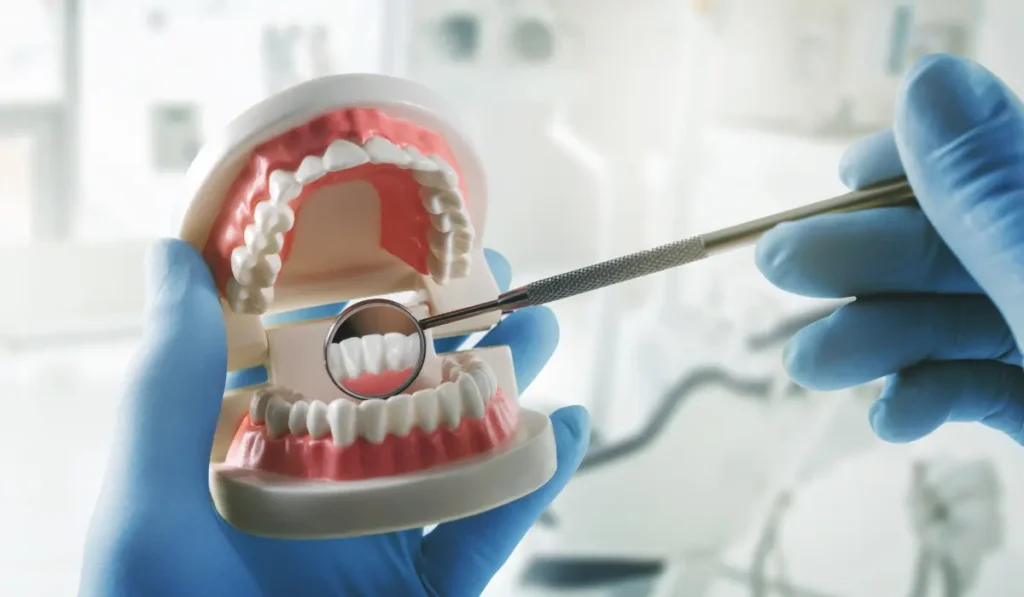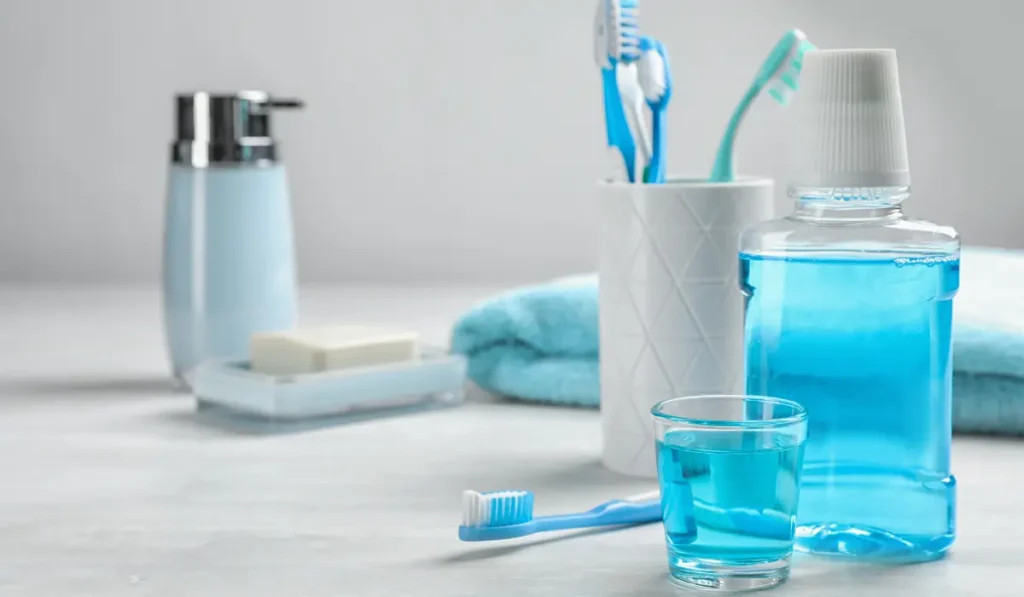Oral hygiene refers to the practice of maintaining the cleanliness of the mouth, teeth, and gums to prevent dental diseases; the most prevalent being cavities, gingivitis, and periodontal disease. A sound oral hygiene practice plays an important role not only in oral health but also in benefiting overall health. Such practices involve quite a number of necessary steps that include brushing, flossing, and regular dental check-ups. The knowledge and practice of good oral hygiene provide good results such as a healthy mouth and bright smile.
Importance of Oral Hygiene

Maintenance of proper oral hygiene is vital not only for the health of your mouth but also for your general health. Good oral habits prevent the formation of dental plague, a sticky film of bacteria that forms in mouths over the teeth and gums. When left hiding in the mouth, plague can result in dental problems like tooth decay, gum disease, and bad breath. Moreover, oral health is related to other health problems like cardiovascular diseases, diabetes, and some infections of the respiratory tract. Thus, maintaining oral health also secures one’s overall health status.
Common Dental Issues
Maintaining oral hygiene will prevent many dental issues. However, even with the best of care, common dental issues can befall you. Understanding them helps you identify their signs early and seek appropriate treatment.
Tooth Decay
Dental caries is the demineralization of the enamel by an acid attack from the plaque. The results of this process will be the shallow holes in the teeth, which become larger and involve deeper layers of the structure of the affected tooth. Poor brushing habits, frequent snacking on sugary foods and drinks, and failure to visit the dentist regularly have been stated to be factors that contribute to tooth decay. Some of the strategies for tooth decay include:
– At least twice a day, brushing of teeth with fluoride toothpaste
– Daily, flossing between teeth to remove plaque
– Limiting foods with sugars and acids
– Regular dental check-ups for professional cleanings and exams
Gum Disease
Periodontal, or gum disease, is a bacterial infection of the tissues supporting your teeth. It’s most often caused by poor brushing and flossing habits that allow plaque-a sticky film of bacteria-to build up on teeth and harden. Early-stage gum disease can cause symptoms such as red, swollen, bleeding gums, also called gingivitis. When left untreated, it can become periodontitis, advanced gum disease, and eventually lead to tooth loss. Prevention includes:
– Regular brushing and flossing to remove the plaque
– Use antibacterial mouthwash that would reduce the count of bacteria promoting plaque.
– Regular dental checkups for cleaning and follow-up on plaque
Bad Breath
Chronic bad breath, also known as halitosis, is an embarrassing condition and, in most cases, is related to improper hygiene of the oral cavity. This may be a symptom of an underlying dental condition, including gum disease or dry mouth, or an after-effect from using some food items, such as onions and garlic. The methods of combating bad breath are pretty effective since regular oral hygiene involves brushing teeth and tongue, the use of a mouthwash that kills bacteria.
– Rest well, sleep enough
– Visit the dentist regularly so dental problems that result in bad breath can be treated.
Symptoms of Poor Oral Hygiene
Being able to identify the signs and symptoms of bad oral hygiene will help a person prevent serious oral health issues. Some of the typical signs are bad breath which is attributed to the accumulation of bacteria in one’s mouth leading to a foul taste and smell. Gum problems such as the often red, swollen or bleeding gums are usually a symptom of bad gum health due to plaque accumulation and gingivitis. Also, most of the toothaches or sensitivity to hot and cold temperatures are implications of tooth decay or erosion of enamel. Other detectable signs may include persistent lousy taste in your mouth or discoloration of tongue, color, and texture. One should consult a dental professional from time to time if these symptoms persist.
Effective Cleaning Practices
Maintaining rigorous oral cleaning is the key to achieving and maintaining a healthy mouth. Proper brushing and flossing can be the two most significant things done for the mouth and overall health.
Brushing Techniques
Use a soft-bristled toothbrush and fluoride toothpaste to brush the teeth. Put the toothbrush at a 45-degree angle to the gum at the start of the brushing. Employ circular, vibrating strokes around all tooth surfaces on the outside, inside, and chewing surfaces. The stroke should be firm but without discomfort.
Make sure to brush, brush in the morning and before going to bed for at least two minutes each time. This is because it requires two minutes only to clean all the deposits from your teeth, including the plaque. Besides, do not forget to brush your tongue because it removes bacteria and gives your mouth a fresh breath. Replacing your toothbrush cross a new one every three to four months or in cases where bristles are spread this should help fight bad brushing.
Flossing Techniques
Flossing should be done as a complement to brushing, since it would remove plaque and food particles in areas hard to reach by a toothbrush: between your teeth and a bit close to the gum line. Take about 18 inches of the floss and wind most of it around one of your middle fingers and the remaining length around the opposite middle finger. Hold the floss tightly with your thumbs and forefingers, guiding it between your teeth using a gentle sawing motion.
When the floss reaches the gum line, make it into a ‘C’ shape against one tooth and gently slide it into the space between the gum and the tooth. Repeat this approach for every tooth. Be very careful not to snap the floss against your gums, as this can cause injury or irritation to the gums.
The Role of Regular Dental Check-ups
Regular dental check-ups are essential in one’s life for oral health. Dentists can check the health of your teeth, your gums, and assess your mouth in general. They really help in the early detection of any threatening issues, which could be the cause of a major problem at their peak. With regular checkups, a dentist will be able to do thorough cleaning of your teeth by removing plaque and tartar, which can easily result from proper home care. It helps in preventing the development of cavities and gum diseases.
Early Detection of Oral Health Issues
In the course of this, early signs of decay, gum disease, and a number of other oral health conditions are also checked. Early detection makes it easy and less invasive to treat them. Moreover, dentists screen for signs of oral cancer, and this condition is so easily treatable at its early stage. All this regular visiting, therefore, not only averts oral health but also keeps away other risks, complications, and hence the need for more complex and expensive procedures.
Education and Preventive Advice
The other advantage that comes with frequent visits to the dentist is that the professional can always give you advice. Depending on the current condition of your teeth or mouth as identified by the dentist, the dentist is likely to advise you on the special products or techniques that are most suitable for you. That is, if you have a propensity for gum disorders, the dentist might suggest a particular mouthwash or alterations in the brushing or flossing technique. Such advice can, therefore, be very specific to a given person, enhancing one’s daily practices concerning oral hygiene, hence contributing to very long-term dental health.
Importance of Fluoride

Fluoride is very important in enhancing dental health since it helps in the strengthening of the of the enamel hence able to resist decays. It can as well effectively reserve the very initial stage of decay where the enamel has begun to dissolve back by reversing such areas by the process of remineralization. This process of remineralization is of great importance in maintaining the health and structure of the teeth.
Sources of Fluoride
Fluoride is obtained in two forms: Systemic and topical. Individuals treat the surface of the teeth with topical fluorides through the use of fluoridated toothpaste or mouth washes. Some of the chemical medication that dentists might prescribe includes a class of gel, foam, or varnish known as fluoride dental treatments. Individuals consume systemic fluoride in water or supplements it with nutrients in their daily meals and drinks. This type helps to strengthen developing teeth from within, offering benefits before the teeth have even emerged in the mouth.
Benefits of Fluoride in Public Health
A controlled fluoride level in drinking water provides important public health benefits. Communities that maintain an adequate level of fluoride in drinking water have fewer cavities and less dental decay in populations. This has made fluoridation, to most people, the single most effective means of preventing tooth decay on a large scale. Many health organizations of the world, including the World Health Organization and the Centers for Disease Control and Prevention, recommend adding fluoride in water as it helps to prevent and control diseases among people of all age groups and income levels.
Nutrition and Oral Health
Balanced Diet
A balanced diet plays a significant role in healthy dentin. The different nutrients, along with their intake quantity in your body, are crucial for maintaining the soft and hard tissues of your mouth in a healthy state. Calcium-containing dairy products, leafy greens, and similar foods help maintain the bones that support your teeth. Phosphorus is another essential component, which you can obtain in large quantities from eggs, fish, and lean meat.
Foods to Avoid
There are certain foods and beverages that can damage the dental health of the teeth and should be consumed in moderation:
– Sticky and sugary candies: They stick to teeth and can promote cavities if not adequately removed shortly after eating.
– Carbonated soft drinks: Common ingredients of this group include phosphoric and citric acids. These lead to the loss of tooth enamel. The drinks are usually high in sugar content, making them potentially a double whammy in promoting tooth decay.
– Starchy foods: Foods, including chips, bread, pasta, and crackers, tend to stay in the mouth. Such fulfillments break down to simple sugars and become food to the dental plate.
– Citrus fruits: Indeed, they have ample vitamin C. However, it has acids that cause erosion of enamel when repeatedly taken in large quantities.
The Impact of Harmful Substances
Tobacco
In fact, most gum diseases and mouth cancer are arguably the biggest risk factors for the use of tobacco products. Besides, it weakens the structural strength of your gums and hinders them from healing in case of a damaged gum. In fact, it disfigures your teeth and gives you bad breath. By attacking the firmness of your gums, tobacco diminishes the possibility of your gums offering a solid foundation to support your teeth, whether for chewing or otherwise.
Sugary Foods
Sugary foods are known to have an effect on oral health. The bacteria in our mouth feed on the sugars in the foods and sweet beverages to produce acid, which causes the teeth to decay. This acid also tends to break down tooth enamel and may lead to cavities over time. Controlling the intake of sugary foods and considering alternative and healthier options, such as xylitol-sweetened or unsweetened foods, goes a long way in reducing the potential risks of dental issues. Drinking water often, and especially after sweet treats, helps rinse sugars and acids out from the mouth and offers extra protection.
Daily Oral Hygiene Habits
Drinking Water
The simplest method for maintaining oral hygiene is by drinking water. Water reduces particles of food from the mouth that would act as nutrients to bacteria, and it dilutes acids and sugars. It also balances the pH in your mouth and hinders the bad bacterial growth that causes dental caries. Drinking water regularly after meals greatly decreases your chance of developing cavities because it washes away the acid formed by bacteria in your mouth.
Using Mouthwash
The use of mouthwash in your daily care can increase dental health markedly. Mouth washes reduce acid in your mouth, clean hard-to-brush areas in and around the gums, and re-mineralize the teeth. Look for a mouthwash with fluoride to help protect against tooth decay. While mouthwash is great, remember it doesn’t take the place of brushing and flossing; it’s an addition to help reach the areas that otherwise may be missed.
Tongue Scraping
Tongue scraping is not a small part of oral hygiene. The tongue also contains bacteria and any part of the mouth that contains food particles which the brush may not reach, a tongue scraper eliminates this material and therefore reduces cases of bad breath. Regular tongue scraping can also enhance taste by allowing your taste buds to come into direct contact with flavors, reducing obstruction by plaque buildups.
Treatments for Common Conditions
Tooth Sensitivity
One of the most common issues in dentistry is tooth sensitivity, which is described as a sharp pain or ache in the teeth due to specific substances and temperatures. Special toothpaste and fluoride gels or varnishes for the treatment of tooth sensitivity, which a dentist can apply, block the sensation transmission from the tooth surface to the nerve. The use of these treatments is very effective in reducing sensitivity because the teeth will be less sensitive after a little time because of repeated applications.
Cavities
Cavities are the result of tooth decay and may become a painful experience for individuals if it becomes too sensitive. The end results could be tooth loss, treated best with the use of a filling material. The best time to know whether an individual has cavities is by going to the dentist for check-up and cleaning to detect the cavities and prevent further procedures.
Gum Infections
Gum infections, more commonly known as periodontal diseases, can be prevented with appropriate dental oral health care. Treatment options may include professional dental cleaning to have the plaque or tartar eliminated. It often needs medication or surgery in the majority of severe cases. Good oral hygiene habits include brushing teeth, flossing daily, using mouthwashes, etc., and are an essential protocol to prevent gum infections.
Preventative Measures for Optimal Oral Health

Sealants
Dental sealants are effective preventive measures in protecting children and teenagers against teeth decay. Dental sealants are thin plastic or any other material used within the dental fields to protect the chewing parts of the back teeth, including the molar and premolar. These parts are more affected by decays simply because the hollowness is hard to clean, and even the small furrows trap some food particles. Sealants bond quickly into the depressions and grooves of the teeth, forming a protective shield over the enamel of each tooth. On average, sealants can protect the teeth from decay for up to 10 years, but they do need to be checked for wear and chipping at regular dental visits.
Night Guards
Night guards can be a useful tool for those who grind their teeth at night. Medically, grinding teeth is referred to as bruxism. These custom-fitted devices fit over your teeth and prevent damage caused by grinding and clenching. They help prevent damage not only to the enamel but also reduce the strain exerted on the jaw muscles and joints, which may eventually lead to a TMJ (temporomandibular joint) disorder. Dentists typically make night guards from a lightweight, durable material and design them to fit comfortably so that they do not interfere with your sleep while providing protection.
Conclusion and Recommendations
All these are important for your dental health; further, some general visits to the dentist would prevent many tooth problems. Here, then, are some tips on keeping your proper oral hygiene:
- Brush your teeth at least twice a day using fluoride toothpaste.
- Clean the teeth from plaque and food particles with dental floss that brushes alone cannot reach.
- Replace your toothbrush at the end of three to four months when the bristles are frayed.
- Schedule appointments for dental visits and cleaning. This should ideally be at least after every six months.
- Discourage sugar-loaded snacks and acidic drinks that destroy tooth enamel.
These simple practices will help you maintain a healthy mouth, strong teeth, and a beautiful smile for many upcoming years.